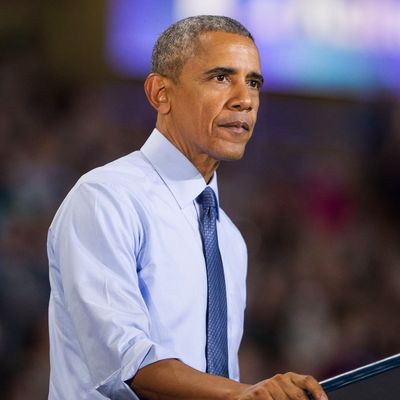
In January, Barack Obama will cede the Oval Office to the king of the birther movement. Shortly after, the Supreme Court’s conservative majority will be restored; federal agencies will be stocked with reactionaries and incompetents; America will back out of its commitments to curb carbon emissions; Paul Ryan will stand behind Donald Trump, watching as he signs a piece of paper for the cameras, and millions of Americans will suddenly lose their health insurance; taxes will be slashed, along with social spending; wealth will become even more concentrated in the hands of the few; and an emotionally volatile man who admires authoritarians — and obsesses about revenge — will command the most powerful army and far-reaching surveillance state in human history.
So, ya know, it’s been a bad couple of days for the left.
But there is one piece of good news for progressives — or at least those of the Sanders-Warren variety: The Trans-Pacific Partnership is dead.
In a meeting with the AFL-CIO’s executive council Thursday morning, Chuck Schumer announced that the trade agreement would not be ratified by Congress, due, in part, to Republican opposition, the Washington Post reports.
The global trade agreement had been one of Barack Obama’s top second-term priorities, part of the president’s desired “pivot” to strengthen America’s ties to its Asian allies, in a bid to check the strength of a rising China.
But, whatever the agreement’s geopolitical merits, it contained several provisions that drew the ire of labor leaders and economic progressives.
One of these was the Investor State Dispute Settlement Process, a legal mechanism that allows corporations to challenge government regulations that disadvantage their business interests before an arbitration panel whose rulings cannot be appealed. If a corporation wins such a settlement, the offending government is forced to either rewrite its regulations or pay fines to compensate the company for its lost profits. (Currently, TransCanada is using the ISDS provision in NAFTA to demand $15 billion from the United States in compensation for the Obama administration’s decision to veto the Keystone XL Pipeline.)
Another was its extension of patent and copyright protections, which would have driven up the costs of pharmaceuticals in the developing world, while making it more difficult for progressives to lower drug prices at home via patent reform. Economist Dean Baker explains that the effect of such protections (which are, in effect, restrictions on free trade) is to redistribute income upward:
Making patents and copyrights longer and stronger, both here and around the world, redistributes income from the bulk of the population to those in a position to profit from these protections. This is the story of the Hepatitis C drug Sovaldi, which has a list price of $84,000. The free market price is a couple hundred dollars. We will pay more than $430 billion this year for drugs that would sell for 10–20 percent of this amount in a free market.
While these technical details raised the ire of left-leaning wonks, the TPP also became a symbol of a broader, vaguer discontent with globalization among factions of both parties.
It’s unclear what inspired Donald Trump to make opposition to the TPP central to his presidential campaign (it seems possible that he merely wished to promote his talents as a “deal-maker” by criticizing any “deals” made by the sitting president).
But packaged with other anti-globalization policies, the position resonated, and Republican voters changed their views about free trade.
Meanwhile, Bernie Sanders and prominent labor groups forced Hillary Clinton to renounce her support for the deal.
With both party standard-bearers campaigning against the agreement, interest waned on Capitol Hill. Trump’s surprise election appears to be the nail in the TPP’s coffin.
“I think the president-elect made it pretty clear he was not in favor of the current agreement,” Senate Majority Leader Mitch McConnell told the Washington Post. “But he has the latitude because [congressional negotiating authority] is in place through the next administration to negotiate better deals, as I think he would put it, if he chooses to.”






























